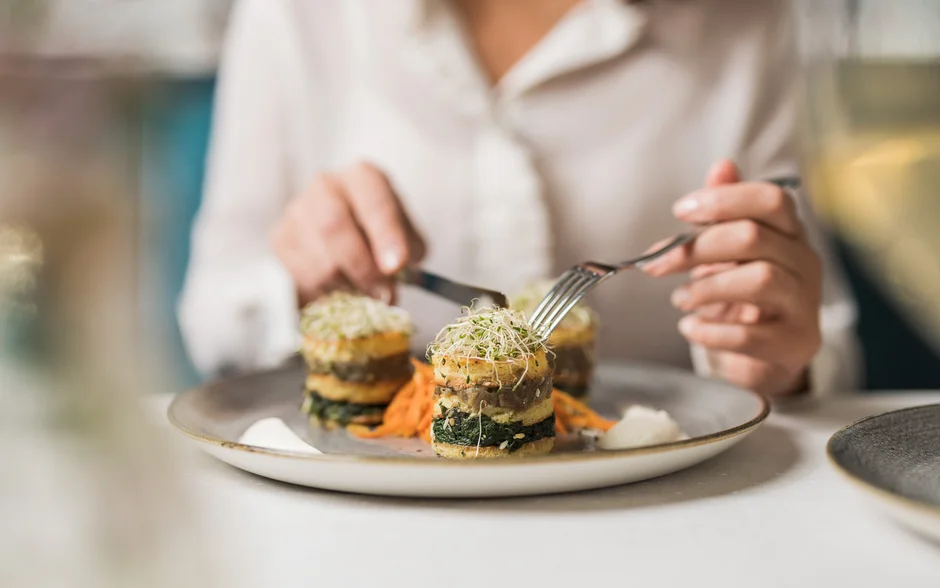Not all organic products are created equal
Do you value healthy eating and animal welfare? Then you probably make a conscious effort to buy food products that carry an organic label – and rightly so. Certified organic products that meet the criteria of a recognised organic label are always produced in a more sustainable and animal-friendly way than conventional products.
However, the abundance of quality seals can be quite confusing. Mirjan Köhler, head chef at the BIO Hotel Leutascherhof, provides an insight into the variety of organic labels and their significance. Organic quality seals confirm the value of food, offer security when shopping and also justify a higher price.
Mirjan Köhler: ‘First of all, you need to know which labels really indicate certified food. Bio Austria, Bioland, Naturland and the EU organic label are among them.’ Controlled cultivation, controlled quality and similar designations, on the other hand, have absolutely nothing to do with organic quality. They belong in the realm of marketing and have no verifiable meaning. If you want to be on the safe side, choose products with the organic seals of approval listed above.
Hello Mirjan, what is the difference between the various organic seals of approval?
Every recognised organic seal of approval is awarded on the basis of a defined set of criteria. This specifies the conditions of husbandry and the number of farm animals per square metre or per farm, and also regulates feed quality and medical interventions. These catalogues are very comprehensive and are also continuously updated. For the layperson, the details are difficult to understand or require a great deal of effort. However, you can really rely on the labels mentioned above. When shopping, you should look specifically for these quality labels if you value certified organic quality. The member farms of these quality labels are continuously inspected, even unannounced.
Can you describe the labels for us a little?
Gladly. Let's take the EU organic label, Bio Austria and Demeter as examples, as these are three quite different approaches. But I would like to say right from the outset that every organic label offers high added value compared to conventional products. For example, chemical synthetic pesticides are also 100% prohibited under the EU organic label. So you could say that every recognised organic label definitely benefits the environment and agriculture. What really sets Bio Austria apart is the fact that the entire farm must be converted to organic farming. There must be no parallel economy with conventional production. Demeter goes one step further with its own philosophy. Here, plant extracts are used extensively, and subtle matter is an indispensable part of Demeter organic farming.
Can you give us a few figures to make the organic labels more tangible?
Yes, let's start with the keeping of laying hens. In conventional agriculture, there are no restrictions whatsoever on the size of the coop; you can keep as many chickens as will fit in it. The EU organic label allows a maximum of 20,000 laying hens per coop, Naturland 12,000, Bioland 6,000, Demeter and Bio Austria only 3,000. The optimal coop size has to do with the foraging behaviour of chickens, which do not like to stray far from the coop because they have a strong natural need for security. Smaller coops better meet this need. Another parameter for organic quality is the number of additives permitted. In conventional agriculture, more than 300 are permitted, while Demeter allows only 13 and Bio Austria, with around 25 permitted additives, is in the very good upper range. A word on organic feed and genetic engineering: the EU organic label allows five per cent conventional feed and up to five per cent genetically modified products. This is completely excluded by other quality labels, which require 100 per cent organic feed and prohibit genetic engineering entirely.
What do you think of the slogan ‘Regional is the new organic’?
With all due respect, that's complete nonsense. A farmer in Tyrol, for example, may keep more cattle than he can feed on his pastureland. So he buys soy from Brazil. The cattle may be kept regionally, but that says nothing about the carbon footprint and quality of the feed. The best products are organic products from the region. They are high-quality, controlled and certified, and have the lowest carbon footprint. That's the optimal combination that I also rely on as a chef when shopping.
In Leutasch, many products cannot be produced locally simply because of the altitude, regardless of whether they are organic or not. Since we use 100 per cent organic food in our business anyway, I pay attention to the supply chain: region – Austria – and then others. And it's obvious that a pineapple doesn't come from Tyrol. Organic and ecology are another important topic in this context, which we can also discuss another time.
Dear Mirjan, thank you very much for the insightful conversation!



